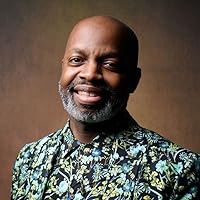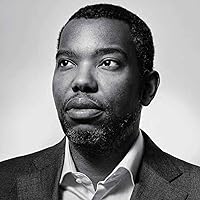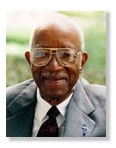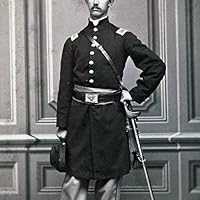Confederacy Quotes
Quotes tagged as "confederacy"
Showing 1-25 of 25

“Tyranny flourishes in those societies that reject the Reformed Faith. Tyranny is squelched and liberty flourishes in those societies that embrace the Reformed Faith in all its fullness.”
― Lectures on The South: A Collection of Studies
― Lectures on The South: A Collection of Studies

“The most important thing now, his father told him: Grow. Gather. Keep. Because then, in the echoing halls, and even in future whispers, they will build monuments in your honor and you will be remembered not for your failures—not for your stumbles or your transgressions or your kills—but for only your greatest triumphs.”
― The Prophets
― The Prophets

“The Lost Cause was not an accident. It was not a mistake that history stumbled into. It was a deliberate, multi-faceted, multi-field effort predicated on both misremembering and obfuscating what the confederacy stood for. And the role slavery played in shaping this county.”
― How the Word Is Passed: A Reckoning with the History of Slavery Across America
― How the Word Is Passed: A Reckoning with the History of Slavery Across America

“I've been here in Richmond for six years and I still don't get it. To me, having the principal Richmond monuments dedicated to the Lost Cause is like saying we're dedicated to no hope, no future. It's like having a monument to unrequited love.”
― Confederates in the Attic: Dispatches from the Unfinished Civil War
― Confederates in the Attic: Dispatches from the Unfinished Civil War

“She had seen Southern men, soft voiced and dangerous in the days before the war, reckless and hard in the last despairing days of the fighting. But in the faces of the two men who stared at each other across the candle flame so short a while ago there had been something that was different, something that heartened her but frightened her — fury which could find no words, determination which would stop at nothing.
For the first time, she felt a kinship with the people about her, felt one with them in their fears, their bitterness, their determination. No, it wasn’t to be borne! The South was too beautiful a place to be let go without a struggle, too loved to be trampled by Yankees who hated Southerners enough to enjoy grinding them into the dirt, too dear a homeland to be turned over to ignorant people drunk with whisky and freedom.
As she thought of Tony’s sudden entrance and swift exit, she felt herself akin to him, for she remembered the old story how her father had left Ireland, left hastily and by night, after a murder which was no murder to him or to his family. Gerald’s blood was in her, violent blood. She remembered her hot joy in shooting the marauding Yankee. Violent blood was in them all, perilously close to the surface, lurking just beneath the kindly courteous exteriors. All of them, all the men she knew, even the drowsy-eyed Ashley and fidgety old Frank, were like that underneath — murderous, violent if the need arose. Even Rhett, conscienceless scamp that he was, had killed a man for being “uppity to a lady.”
― Gone with the Wind
For the first time, she felt a kinship with the people about her, felt one with them in their fears, their bitterness, their determination. No, it wasn’t to be borne! The South was too beautiful a place to be let go without a struggle, too loved to be trampled by Yankees who hated Southerners enough to enjoy grinding them into the dirt, too dear a homeland to be turned over to ignorant people drunk with whisky and freedom.
As she thought of Tony’s sudden entrance and swift exit, she felt herself akin to him, for she remembered the old story how her father had left Ireland, left hastily and by night, after a murder which was no murder to him or to his family. Gerald’s blood was in her, violent blood. She remembered her hot joy in shooting the marauding Yankee. Violent blood was in them all, perilously close to the surface, lurking just beneath the kindly courteous exteriors. All of them, all the men she knew, even the drowsy-eyed Ashley and fidgety old Frank, were like that underneath — murderous, violent if the need arose. Even Rhett, conscienceless scamp that he was, had killed a man for being “uppity to a lady.”
― Gone with the Wind
“In the former capital of the confederacy, equalities surest foothold was found on the autopsy table.”
― All the Sinners Bleed
― All the Sinners Bleed

“The fear had precedent. Toward the end of the Civil War, having witnessed the effectiveness of the Union's 'colored troops,' a flailing Confederacy began considering an attempt to recruit blacks into its army. But in the nineteenth century, the idea of the soldier was heavily entwined with the notion of masculinity and citizenship. How could an army constituted to defend slavery, with all of its assumptions about black inferiority, turn around and declare that blacks were worthy of being invited into Confederate ranks? As it happened, they could not. 'The day you make a soldier of them is the beginning of the end of our revolution,' observed Georgia politician Howell Cobb. 'And if slaves seem good soldiers, then our whole theory of slavery is wrong.' There could be no win for white supremacy here. If blacks proved to be the cowards that 'the whole theory of slavery' painted them as, the battle would be lost. But much worse, should they fight effectively--and prove themselves capable of 'good Negro government'--then the larger war could never be won.”
― We Were Eight Years in Power: An American Tragedy
― We Were Eight Years in Power: An American Tragedy

“Then above the confused sounds Stuart Tarleton's voice rose, in an exultant shout, 'Yee-aay-ee!' as if he were on the hunting field. And she heard for the first time, without knowing it, the Rebel yell.”
― Gone with the Wind
― Gone with the Wind

“Why had he gone, stepping off into the dark, into the war, into a Cause that was lost, into a world that was mad? Why had he gone, Rhett who loved the pleasures of women and liquor, the comfort of good food and soft beds, the feel of fine linen and good leather, who hated the South and jeered at the fools who fought for it? Now he had set his varnished boots upon a bitter road where hunger tramped with tireless stride and wounds and weariness and heartbreak ran like yelping wolves. And the end of the road was death. He need not have gone. He was safe, rich, comfortable. But he had gone, leaving her alone in a night as black as blindness, with the Yankee Army between her and home.”
― Gone With The Wind
― Gone With The Wind
“What is that statue?" I asked. "A Civil War general--probably Lee's," Amzie said. "What else is on the courthouse lawn?" The statue stood on one side of the entrance and a beautiful tree on the other. "What kind of tree is that?" I asked. "I don't know for sure," Amzie replied, "but I think it's an oak. Big, ain't it? Strong, too. Been there a long time."
For a moment he sat still and full of thoughts. "Let's look around town," I said. "Wait," he replied. "You just gave me a thought. There's a picture of the South if I ever saw one. That Southern general and that tree. One is the dead past and the other the living present. This South is sure caught in between--between life and death.”
― Down the Line: The Collected Writings of Bayard Rustin
For a moment he sat still and full of thoughts. "Let's look around town," I said. "Wait," he replied. "You just gave me a thought. There's a picture of the South if I ever saw one. That Southern general and that tree. One is the dead past and the other the living present. This South is sure caught in between--between life and death.”
― Down the Line: The Collected Writings of Bayard Rustin

“These women, so swift to kindness, so tender to the sorrowing, so untiring in times of stress, could be as implacable as furies to any renegade who broke one small law of their unwritten code. This code was simple. Reverence for the Confederacy, honor to the veterans, loyalty to old forms, pride in poverty, open hands to friends and undying hatred to Yankees. Between them, Scarlett and Rhett had outraged every tenet of this code.”
― Gone with the Wind
― Gone with the Wind

“The Confederate flag stopped flying as the pennant of reconciliation, the joining of the southern military tradition to northern establishment might to spread Americanism abroad. It now was the banner of those who felt that the establishment had sacrificed that tradition, "stabbed it in the back." The battle flag became the banner not of a specific Lost Cause but of all of white supremacy's lost causes.”
― The End of the Myth: From the Frontier to the Border Wall in the Mind of America
― The End of the Myth: From the Frontier to the Border Wall in the Mind of America
“There are former Confederates who sought to redeem themselves—one thinks of James Longstreet, wrongly blamed by Lost Causers for Lee’s disastrous defeat at Gettysburg, who went from fighting the Union army to leading New Orleans’s integrated police force in battle against white-supremacist paramilitaries. But there are no statues of Longstreet in New Orleans. Lee was devoted to defending the principle of white supremacy; Longstreet was not. This, perhaps, is why Lee was placed atop the largest Confederate monument at Gettysburg in 1917, but the 6-foot-2-inch Longstreet had to wait until 1998 to receive a smaller-scale statue hidden in the woods that makes him look like a hobbit riding a donkey. It’s why Lee is remembered as a hero, and Longstreet is remembered as a disgrace.”
― The Cruelty Is the Point: The Past, Present, and Future of Trump's America
― The Cruelty Is the Point: The Past, Present, and Future of Trump's America

“[The South's] obsession was to maintain a government, an economy, an arrangement of the sexes, a relationship of the races, and a social system that had never existed...except in the fertile imagination of those who would not confront either the reality that existed or the change that would bring them closer to reality.”
―
―

“Besides the moral courage required to accept commissions in the Fifty-fourth at the time it was organizing, physical courage was also necessary, for the Confederate Congress, on May 1, 1863, passed an act, a potion of which read as follow: -
Section IV. That every white person being a commissioned officer, or acting as such, who, during the present war, shall command negroes or mulattoes in arms against the Confederate States, or who shall arm, train, organize, or prepare negroes or mulattoes for military service against the Confederate States, or who shall voluntarily aid negroes or mulattoes in any military enterprise, attack, or conflict in such service, shall be deemed as inciting servile insurrection, and shall, if captured, be put to death or be otherwise punished at the discretion of the Court.”
― History of the Fifty-Fourth Regiment of Massachusetts Volunteer Infantry, 1863-1865
Section IV. That every white person being a commissioned officer, or acting as such, who, during the present war, shall command negroes or mulattoes in arms against the Confederate States, or who shall arm, train, organize, or prepare negroes or mulattoes for military service against the Confederate States, or who shall voluntarily aid negroes or mulattoes in any military enterprise, attack, or conflict in such service, shall be deemed as inciting servile insurrection, and shall, if captured, be put to death or be otherwise punished at the discretion of the Court.”
― History of the Fifty-Fourth Regiment of Massachusetts Volunteer Infantry, 1863-1865

“None of this means of course that Robert E. Lee wasn't influenced by his father, or didn't inherit some of his better characteristics. Like Henry Lee, Robert was tall, physically strong, a born horseman and soldier, and so courageous that even his own soldiers often begged him to get back out of range, in vain of course. He had his father's gift for the sudden flank attack that would throw the enemy off balance, and also his father's ability to inspire loyalty--and in Robert's case, virtual worship--in his men. On the other hand, perhaps because of Henry Lee's quarrels with Jefferson and Madison, Robert had an ingrained distrust of politics and politicians, including those of the Confederacy. But the most important trait that influenced Robert was a negative one: his father had been voluble, imprudent, fond of gossip, hot-tempered, and quick to attack anybody who offended or disagreed with him. With Henry Lee, even minor differences of opinions escalated quickly into public feuds. Robert was, or forced himself to be, exactly the opposite. He kept the firmest possible rein on his temper, he avoided personal confrontations of every kind, and he disliked arguments. These characteristics, normally thought of as virtues, became in fact Robert E. Lee's Achilles' heel, the one weak point in his otherwise admirable personality, and a dangerous flaw for a commander, perhaps even a flaw that would, in the end, prove fatal for the Confederacy. Some of the most mistaken military decisions in the short history of the Confederacy can be attributed to Lee's reluctance to confront a subordinate and have it out with him on the spot, face to face.”
― Clouds of Glory: The Life and Legend of Robert E. Lee
― Clouds of Glory: The Life and Legend of Robert E. Lee
“A billionaire plutocrat is now sitting in the White House. Democracy has been overthrown. A right wing coup d’état has taken place. The Confederacy has defeated the Union. Racist Nazis are now running America, calling themselves “patriots”. They are the enemies of the People, the enemies of America, and the enemies of the world. We need to reboot the world.”
― Full Retard: The Dumbest Just Got Dumber
― Full Retard: The Dumbest Just Got Dumber

“The overseas frontier—wars in Cuba, the Dominican Republic, the Philippines, Nicaragua, and Haiti—acted as a prism, refracting the color line abroad back home. In each military occupation and prolonged counterinsurgency they fought, southerners could replay the dissonance of the Confederacy again and again. They could fight in the name of the loftiest ideals—liberty, valor, self-sacrifice, camaraderie—while putting down people of color.”
― The End of the Myth: From the Frontier to the Border Wall in the Mind of America
― The End of the Myth: From the Frontier to the Border Wall in the Mind of America

“Netherton was looking at the oversized bronze head of a bearded man, its neck having been crudely severed from whatever figure it must once have topped. “Lee,” said Fearing, noting the direction of Netherton’s gaze. “Robert E.” The name meaning nothing to Netherton.”
― Agency
― Agency
“Privilege is saving confederacy statues because they're 'historic' but bulldozing through ancient sacred sites & artifacts for pipelines.
(8/18/2017 on Twitter)”
―
(8/18/2017 on Twitter)”
―
“Memorial Day has the tendency to conjure up old arguments about the Civil War. That’s understandable; it was created to mourn the dead of a war in which the Union was nearly destroyed, when half the country rose up in rebellion in defense of slavery.”
― The Cruelty Is the Point: The Past, Present, and Future of Trump's America
― The Cruelty Is the Point: The Past, Present, and Future of Trump's America

“White Southerners' commitment to the Confederate cause was not predicated on whether or not they owned slaves. The commitment was based on a desire to maintain a society in which Black people remained at the bottom of the social hierarchy.”
― How the Word Is Passed: A Reckoning with the History of Slavery Across America
― How the Word Is Passed: A Reckoning with the History of Slavery Across America

“So much of the story we tell about history is really the story that we tell about ourselves, about our mothers and our fathers and their mothers and their fathers, as far back as our lineages will take us. Throughout our lives we are told certain stories and they are stories that we choose to believe--stories that become embedded in our identities in ways we are not always fully cognizant of.
For many of the people I met at Blandford, the story of the Confederacy is the story of their home, of their family--and the story of their family is the story of them. So when they are asked to reckon with the fact that their ancestors fought a war to keep my ancestors enslaved, there is resistance to facts that have been documented by primary sources and contemporaneous evidence. They are forced to confront the lies they have upheld. They are forced to confront the flaws of their ancestors. As Greg Stewart, a member of the Sons of Confederate Veterans, told the New York Times in the aftermath of the 2015 Charleston massacre, "You're asking me to agree that my great-grandparents and great-great-grandparents were monsters." Accepting such a reality would, for them, mean the deterioration of a narrative that has long been a part of their lineage, and the disintegration of so much of who they believed themselves to be in the world.
But as I think of Blandford, I'm left wondering if we are all just patchworks of the stories we've been told. What would it take--what does it take--for you to confront a false history even if it means shattering the stories you have been told throughout your life? Even if it means having to fundamentally reexamine who you are and who your family has been? Just because something is difficult to accept doesn't mean you should refuse to accept it. Just because someone tells you a story doesn't make that story true.”
― How the Word Is Passed: A Reckoning with the History of Slavery Across America
For many of the people I met at Blandford, the story of the Confederacy is the story of their home, of their family--and the story of their family is the story of them. So when they are asked to reckon with the fact that their ancestors fought a war to keep my ancestors enslaved, there is resistance to facts that have been documented by primary sources and contemporaneous evidence. They are forced to confront the lies they have upheld. They are forced to confront the flaws of their ancestors. As Greg Stewart, a member of the Sons of Confederate Veterans, told the New York Times in the aftermath of the 2015 Charleston massacre, "You're asking me to agree that my great-grandparents and great-great-grandparents were monsters." Accepting such a reality would, for them, mean the deterioration of a narrative that has long been a part of their lineage, and the disintegration of so much of who they believed themselves to be in the world.
But as I think of Blandford, I'm left wondering if we are all just patchworks of the stories we've been told. What would it take--what does it take--for you to confront a false history even if it means shattering the stories you have been told throughout your life? Even if it means having to fundamentally reexamine who you are and who your family has been? Just because something is difficult to accept doesn't mean you should refuse to accept it. Just because someone tells you a story doesn't make that story true.”
― How the Word Is Passed: A Reckoning with the History of Slavery Across America
“The students on campuses with such a [Confederate] statue had higher levels of implicit racial bias. This finding speaks to the haunting effects of historical expressions of racism. Not only do these statues cause pain for many black students and faculty; they may help to sustain implicit anti-black bias.”
― Belonging: The Science of Creating Connection and Bridging Divides - Library Edition
― Belonging: The Science of Creating Connection and Bridging Divides - Library Edition

“[On slavery, the Emancipation Proclamation, and the Confederacy] Now, gentlemen, we have got our harpoon into the monster, but we must still take uncommon care, or else by a single flop of his tail, he will send us all to eternity.”
―
―
All Quotes
|
My Quotes
|
Add A Quote
Browse By Tag
- Love Quotes 98.5k
- Life Quotes 77k
- Inspirational Quotes 73.5k
- Humor Quotes 44k
- Philosophy Quotes 30k
- Inspirational Quotes Quotes 27.5k
- God Quotes 26.5k
- Truth Quotes 24k
- Wisdom Quotes 24k
- Romance Quotes 23.5k
- Poetry Quotes 22.5k
- Death Quotes 20k
- Life Lessons Quotes 20k
- Happiness Quotes 19k
- Quotes Quotes 18k
- Faith Quotes 18k
- Hope Quotes 18k
- Inspiration Quotes 17k
- Spirituality Quotes 15k
- Religion Quotes 15k
- Motivational Quotes 15k
- Writing Quotes 15k
- Relationships Quotes 14.5k
- Life Quotes Quotes 14.5k
- Love Quotes Quotes 14.5k
- Success Quotes 13.5k
- Time Quotes 12.5k
- Motivation Quotes 12.5k
- Science Quotes 12k
- Motivational Quotes Quotes 11.5k

